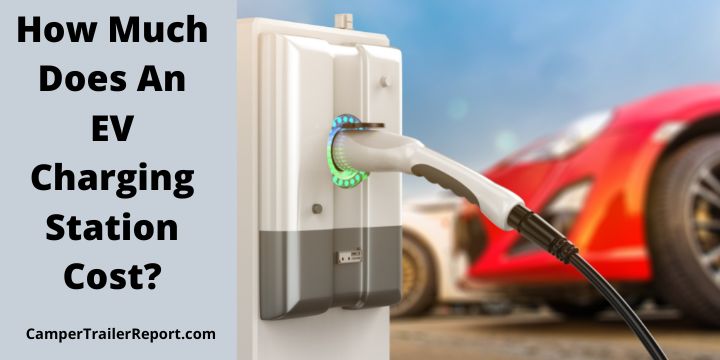
Electric Vehicles Charging Point
An EV is a charging station for electric vehicles such as cars, motorcycles, and scooters. It consists of a power point and a battery charger that is hardwired into the vehicle.
The car’s battery is charged thanks to the charging device, which transforms the electricity into a form that is compatible with the battery. While most charging stations are hardwired into the grid and require an electrical connection, some are meant to be mobile and operate independently.
How much Does an EV Charging Station Cost in 2023?
Power and efficiency are the two main determinants of the cost of charging an electric vehicle. Super-efficient electric automobiles use only 27 kWh per 100 miles, equating to a cost of $0.028 per mile, assuming an average price of power of /10.7 per kWh, which holds for vehicles with a range of 200 miles or more. A charging station for electric cars is costly in the neighborhood at $5.6 per charge.
Considering the average annual driving distance of 11,443 miles, charging an electric car can reach up to $26.68 per month or $320.40 per year. And this makes the expense of electric charging points worthwhile, as they help you save money over your lifespan.
The popularity of electric vehicles (EVs) has risen as the globe strives for a greener tomorrow. This has resulted in a greater need for public EV charging infrastructure. As a result, people are wondering how much a charging station for electric vehicles would set them back in the year 2023.
Several criteria, such as the station’s design and features, will determine the price of an electric vehicle charging station in 2023. Charging stations for electric vehicles can range in price from a few hundred dollars for a basic model to several thousand dollars for one with advanced features like solar panels and Wi-Fi connectivity. The station’s price will include the hardware and labor to set it up and keep it running.
An electric vehicle charging station’s overall price tag is heavily influenced by the rate at which power is sold. Electricity rates are highly variable and may be significantly higher in some places than others. For this reason, the power price in the region where the station is located will also be factored in.
The charging technology chosen will determine how much it costs to install a charging station for electric vehicles in 2023. The effectiveness of the charging technology used will have an impact on the station’s price. DC fast charging technology, for instance, is typically more expensive than AC charging technology, which is reflected in the station’s price.
>> You may also like: How Much Does An EV Charging Station Cost?
What does the kWh cost of charging an electric vehicle?
Depending on the efficiency of the vehicle and the range traveled, the cost of charging an electric car in kW-hours will vary. To evaluate how much electricity is needed to power an electric vehicle, we may look at the kWh/100 miles and the range of the vehicle. The most efficient electric cars use around half as much electricity as the least efficient ones.
The less cost-effective 2020 Porsche Taycan Turbo S, which needs 50 kWh/100 Mile efficiency, and the 2021 Tesla Model 3 Standard, which has an efficiency of 24 kWh/100 mi with a range of 263 miles and takes 63.12 kWh for a full charge. With a range of 192 miles and a charging need of 96 kWh, the price differential can reach as high as 35%, or $30 monthly, for 900-mile usage.
What is the price of recharge for a gas tank fill-up?
Greenhouse gas emissions from electric vehicles are eliminated, and the cars use less power from point A to point B. Additionally, the cost of operating an electric vehicle is lower than that of a conventional car.
Researchers at the Transportation Research Institute at the University of Michigan have found evidence to support this. They rack up an annual average of 11,443 miles on the road, which equates to between $1,509 and $2,036 in gas money spent. Similar distances in an electric vehicle would cost between $367 and $1,106 to charge.
This implies that traveling 100 miles in a gas-powered car will set you between $8.67 and $13.18, whereas driving 100 miles in an electric vehicle would set you back between $3.2 and $9.66.
What is the average price of a charging station for an electric vehicle?
Charging stations for Level 1 and Level 2 electric cars may be purchased for between $400 to $20,200. Greater power DC fast charging stations have higher equipment expenses, increasing the average cost of such a station to $92,000. Also available, albeit at a higher price.
The price of a charging station for an electric car is determined by various variables, including the level of the charging station, the type of electrical equipment needed, the utility’s charging station infrastructure price, and the charging station’s soft expenses and software price.
Final Thought
More and more individuals are converting to electric vehicles, which has increased the popularity of EV charging stations. This is excellent news for the planet, as electric cars create no tailpipe emissions and far less pollution than their gasoline and diesel equivalents.
Charging stations for electric vehicles (EVCPs) make it simple for motorists to power up their cars, increasing the likelihood of converting to EVs and lowering emissions. It’s evident that EVs are where it’s at for the car industry in the future, and EV Charging Stations will be crucial to their adoption.
>> You may also like: Gas vs Diesel For Towing a Fifth Wheel?<<
![Buying a Used RV: Everything You Need to Know. [Updated for 2023] Buying a Used RV](https://cdn-0.campertrailerreport.com/wp-content/uploads/2018/02/Buying-a-Used-RV-720x360.jpg)

